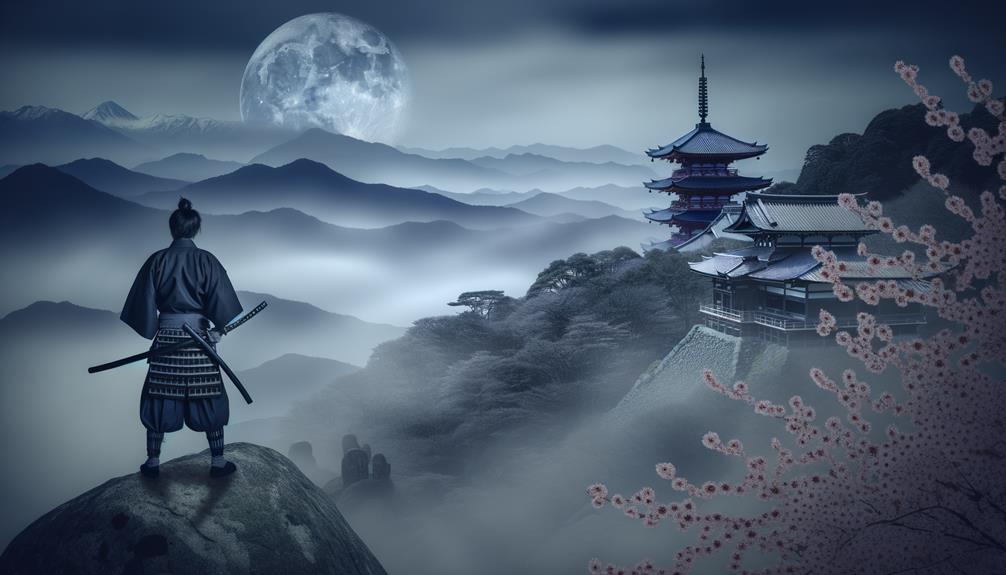Meaning of the Name Ronin
The name Ronin, originating from feudal Japan, derives from 'rō' meaning 'wave' and 'nin' meaning 'person'. Historically, it referred to samurai without a master, embodying the tension between autonomy and societal stigmatization.
Deeply embedded in Japanese cultural identity, Ronin symbolizes resilience and independence. From classic literature like '47 Ronin' to modern media, the concept encapsulates themes of honor, loyalty, and existential struggle.
Its contemporary appeal reflects a universal admiration for the virtues of autonomy and resilience. Exploring further reveals the rich cultural and historical layers underpinning the enduring significance of the name Ronin.

Key Takeaways
- Derived from Japanese words 'rō' (wave) and 'nin' (person), meaning a wanderer or masterless samurai.
- Historically refers to samurai without a lord during feudal Japan's Kamakura and Muromachi periods.
- Symbolizes autonomy, resilience, and honor in Japanese culture.
- Modernly popular in literature, films, and video games, reflecting themes of independence and critical decision-making.
- Universally admired for embodying resilience and autonomy, transcending its Japanese origins.
Historical Origins
Tracing the historical origins of the name 'Ronin' reveals its deep roots in feudal Japan, where it was used to describe samurai who had become masterless. The term derives from the Japanese words 'rō' (浪), meaning 'wave,' and 'nin' (人), meaning 'person.'
This etymology metaphorically represents the ronin as a wave adrift without an anchor, symbolizing their lack of affiliation to a lord or master. Historically, ronin emerged during the Kamakura (1185-1333) and Muromachi (1336-1573) periods, becoming particularly prominent during the Edo period (1603-1868).
These masterless warriors often faced societal stigmatization, their status reflecting broader socio-political dynamics and the rigid hierarchical structure of feudal Japan. Therefore, the term 'Ronin' encapsulates a complex interplay of autonomy, honor, and marginalization.
Symbolism in Japanese Culture
The historical legacy of the ronin extends beyond their societal role to their profound symbolism within Japanese culture, representing themes of resilience, autonomy, and the complexities of honor. Rooted in the feudal era, the ronin were masterless samurai who navigated a path marked by personal responsibility and existential struggle. Their presence in Japanese folklore and history underscores several key symbolic elements:
- Resilience: Ronin exemplify the capacity to endure and adapt amidst adversity.
- Autonomy: They embody the spirit of independence, often making critical decisions outside the traditional samurai code.
- Honor: Despite their masterless status, ronin grappled with the intricate balance between personal honor and societal expectations.
These elements render the ronin a multifaceted symbol, deeply ingrained in Japanese cultural identity.
Literary and Media Representations
In literature and media, the figure of the ronin has been depicted with a rich complexity that explores their existential struggles and moral dilemmas. Historically, ronin were masterless samurai, often portrayed as wandering warriors seeking redemption or vengeance. Their narratives explore themes of honor, loyalty, and societal displacement, reflecting the profound tensions between personal ethics and societal expectations.
| Medium | Example | Theme Explored |
|---|---|---|
| Literature | '47 Ronin' | Loyalty and Revenge |
| Film | 'Yojimbo' | Moral Ambiguity |
| Graphic Novels | 'Usagi Yojimbo' | Honor and Adventure |
These representations not only highlight the historical context of the ronin but also emphasize their enduring relevance in examining human resilience and ethical quandaries.
Modern Popularity
Building on their rich literary and media portrayals, the ronin's modern popularity has surged, reflecting contemporary society's fascination with themes of autonomy, resilience, and moral complexity. This resurgence is evident in various cultural and artistic mediums, where the ronin archetype is reimagined to resonate with modern sensibilities. The concept of the ronin has evolved, mirroring societal shifts towards valuing individualism and ethical ambiguity.
Key manifestations of this trend include:
- Cinema and Television: Contemporary films and series frequently feature ronin-like characters, highlighting their solitary quests and moral dilemmas.
- Literature: Modern novels and graphic novels often draw upon the ronin's storied legacy, adapting it to diverse settings and epochs.
- Video Games: The gaming industry increasingly incorporates ronin narratives, providing immersive experiences that explore their timeless virtues and struggles.
This multifaceted appeal underlines the enduring relevance of the ronin in contemporary culture.
Global Influence
Ronin archetypes have transcended their Japanese origins to exert a profound global influence, permeating various cultural landscapes and artistic expressions worldwide. Rooted in the historical context of masterless samurai, the concept of the Ronin embodies themes of honor, resilience, and autonomy. These attributes resonate universally, fostering admiration and inspiration in diverse settings.
| Region | Influence Area |
|---|---|
| United States | Film and Literature |
| Europe | Art and Philosophy |
| Asia | Modern Media |
In the United States, the Ronin archetype features prominently in films and literature, symbolizing the lone warrior ethos. In Europe, it inspires philosophical discourse and artistic endeavors. Across Asia, modern media adapts the Ronin narrative, integrating traditional values with contemporary themes. This global permeation underscores the Ronin's enduring relevance.
Choosing Ronin as a Name
The name Ronin, deeply rooted in Japanese history and culture, evokes a sense of honor and independence that appeals to many parents seeking a meaningful name for their child.
This name carries significant historical weight, originally referring to samurai who had lost their masters and wandered independently, embodying resilience and self-reliance. Choosing Ronin as a name offers a blend of strength and nobility, making it a compelling choice.
Key considerations include:
- Historical Significance: The name Ronin is steeped in the rich legacy of the samurai, symbolizing courage and autonomy.
- Cultural Resonance: It provides a connection to Japanese heritage and tradition.
- Modern Appeal: Its unique sound and profound meaning make it appealing in contemporary contexts.
Conclusion
The name 'Ronin,' originating from feudal Japan, symbolizes a masterless samurai, embodying themes of independence and resilience.
Its resurgence in modern culture is notable, with a 150% increase in baby name registries over the past decade, reflecting its global influence.
Literary and media portrayals have further cemented its enigmatic appeal.
Choosing 'Ronin' signifies a connection to a rich historical legacy and a profound statement of individuality in contemporary contexts.






